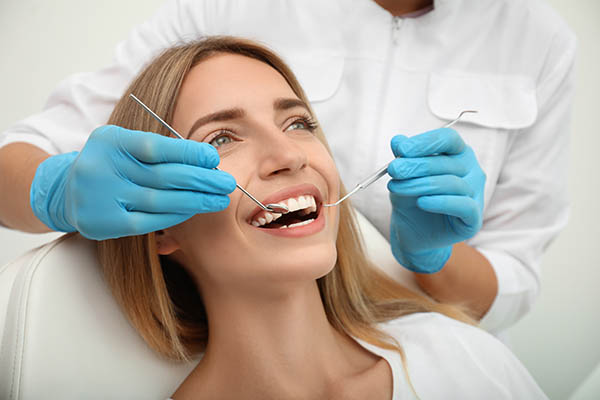How Often Should You Get a Teeth Cleaning?

Whether you are a person who loves to care for your teeth and gums or someone who has been neglectful due to various circumstances, routine teeth cleaning is essential to your oral health. This article will review everything you need to know about professional teeth cleanings, such as:
- Why they are necessary;
- What to expect; and
- How to properly care for your teeth at home.
Why professional teeth cleanings are necessary
Professional teeth cleanings are essential to keeping a patient’s smile healthy and bright. As a general rule, the American Dental Association recommends that everyone, regardless of age, get a professional teeth cleaning twice a year (every six months). This will help the dentist uncover any problems that may have developed since the patient’s last visit and prevent them from worsening.
If, during their standard cleaning, our doctor notices a patient is experiencing dental conditions — such as periodontal disease or tooth decay — we may recommend more frequent visits as part of their treatment plan. However, if the patient’s oral state is normal, we can complete their cleaning appointment in as little as 30 minutes.
What to expect during professional teeth cleanings
The duration of the first appointment will depend on the following factors: how long it has been since the last appointment, if X-rays are needed, and the patient’s age. Suppose the patient has never visited our practice before. In that case, we will review their dental history, take X-rays, and perform a physical examination before beginning the cleaning. This will help give our dentist a better view of the true state of the patient’s oral health.
If there are no signs of decay or gum disease, our dental hygienist or dentist will use special tools to clean the patient’s teeth, also known as scaling. The purpose of a professional teeth cleaning is to remove plaque, tartar, and stains from the surfaces and between teeth.
Plaque is a sticky deposit that can form on the teeth after eating or drinking anything containing sugar (including fruit), starches, or carbohydrates. Tartar forms when plaque is left alone for as little as 48 hours; it is also known as calculus. It can cause pain if left untreated. It also makes it easier for bacteria to grow inside the patient’s mouth, causing periodontal (gum) disease or tooth decay. Stains can come from drinking colored drinks, such as juice, soda, coffee, or tea. They can also appear from smoking cigarettes or eating certain fruits (berries).
We will use a special dental paste to polish the patient’s teeth before applying a fluoride treatment. The fluoride treatment is an added layer of protection against cavities. It can also help relieve sensitive teeth.
Caring for the teeth in between cleanings
Patients will need to be diligent with their oral care at home. Often, patients tend to slack off with certain actions, such as flossing, because they think it is unnecessary to do it every day. This is far from the truth.
To maintain optimal oral health, patients must brush their teeth, ideally with fluoride toothpaste, at least twice daily to prevent plaque buildup and bacteria. In addition, they should floss or use devices, such as a water pick, at least once daily, preferably before bedtime. Using mouthwash after brushing and flossing can help rid the mouth of stubborn bacteria.
Following these tips will help keep the enamel (the tooth’s outer layer) strong, reducing the risk of cavities and brittle teeth.
Schedule your next appointment today
Routine dental cleanings are just as important as at-home care to ensure optimal oral health. We hope you have found this article beneficial. Our team can provide a teeth cleaning in under an hour so that you can enjoy your daily life worry-free.
To schedule an appointment for you or a family member, contact our San Marcos office at (760) 705-3407. We look forward to seeing you.
Check out what others are saying about our dental services on Yelp: Dental Cleaning and Examinations in San Marcos, CA.
Related Posts
Going to the dental office regularly likely means that the teeth will be cleaned on a routine basis, however, this does not mean that a deep teeth cleaning will be done. A deep teeth cleaning is actually different than the routine one that is done at a check-up. Many patients initially believe that a deep…
As a general rule, you should visit a general dentist every four to six months for check-ups and cleaning visits. You may need more frequent visits (or additional visits) if there are specific oral health concerns to address (i.e., dental trauma, cavities, etc.). This review discusses how frequently you should visit a general dentist and…
Though we go to our general dentist all the time, one thing that not everyone considers is the fact that the dentist is the one that handles most of our oral health issues. How is it that one dentist is responsible for treating and diagnosing so many of our problems without the help of specialists…
Clenching and grinding the teeth, also known as bruxism, can wear them down and cause jaw and ear pain. General dentists can help patients with bruxism avoid pain and discomfort. This blog will review the causes, symptoms, and treatments for teeth grinding.It is common for people to be unaware they clench or grind their teeth…
